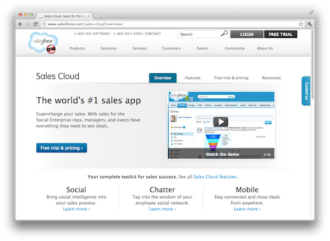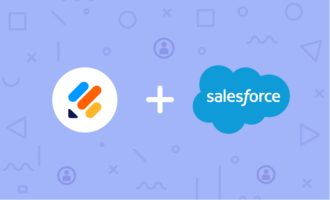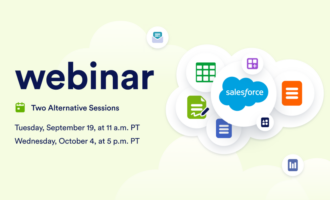In the era of sales automation, Salesforce has emerged as the world’s largest and most advanced cloud-based customer relationship management (CRM) platform, and businesses of every industry and size use it across the globe.
It allows users to centralize customer data, streamline their sales processes, and enhance their marketing efforts from one comprehensive platform with features for managing customer relationships, tracking sales opportunities, and automating marketing campaigns.
With an ever-expanding lineup of features, Salesforce comes with a steep learning curve. Fortunately, grasping the basics is as simple as understanding the most commonly used terms in the platform.
This comprehensive Salesforce glossary covers everything you need to know about key features, capabilities, elements, and more to help you get better acquainted with the platform.
Pro Tip
Jotform is available on Salesforce AppExchange, making it easier than ever to streamline data collection and automate workflows.
Salesforce glossary: General terms
These Salesforce glossary terms cover the fundamentals of the entire platform, relevant to any user whether they’re focused on sales, customer service, or marketing.
- Account: A record in Salesforce that represents an individual or organization with whom a business has a relationship, often a customer or prospect
- App launcher: A menu in Salesforce that allows users to access various applications, tools, and features within the platform, including connected apps like Google Workspace
- AppExchange: Salesforce’s marketplace for third-party applications and add-ons that can be integrated into the platform to extend its functionality
- Chatter: Salesforce’s social collaboration tool that allows users to post updates, share files, and communicate with colleagues within the platform
- Contact: A record in Salesforce that represents an individual associated with an account, typically the contact person for a business or organization
- Custom field: A type of user-defined field to capture data for specific and unique needs, such as tracking customer reviews by creating a custom field to collect each customer’s reviews of a company’s products
- Dashboard: A tool that visually represents data in Salesforce, providing insights and metrics for better decision-making
- Field: A data element or attribute within a Salesforce object, like a name, date, or number
- Lightning: The modern, user-friendly interface of Salesforce, known as Lightning Experience, designed to improve efficiency and user experience
- Object: A fundamental building block in Salesforce that represents a specific type of data, such as account, contact, or lead
- Record: An entry in Salesforce representing information about an entity, such as an account, contact, opportunity, or case
- Report: A tool in Salesforce for creating and viewing data summaries and visualizations to help with data analysis
- Task: A type of record in Salesforce that represents a to-do item or action that needs to be completed, often related to a contact or opportunity
Salesforce glossary: Sales terms
If you’re leveraging Salesforce as a CRM, sales automation platform, or marketing tool, you’ll want to be familiar with the following Salesforce glossary terms.
- Activities: Actions or tasks carried out by sales teams to engage with leads, contacts, and opportunities
- Activity history: A record of past interactions and activities related to a contact, lead, or opportunity
- Campaign: A tool that helps users with all aspects of planning, execution, and tracking of sales and marketing initiatives
- Lead: A record in Salesforce representing a potential customer or prospect
- Opportunity: A record in Salesforce representing a potential sale or deal with a customer
- Opportunity stage: A field that tracks the status of a potential sale
- Pipeline: A visual representation of all current opportunities and their stages, which helps sales teams forecast revenue
- Salesforce inbox: An email system integrated with Salesforce, allowing users to manage emails and contacts within the platform
- Sales stages: Specific steps or phases in the sales process to help sales teams track and manage their deals
Salesforce glossary: Service terms
The following Salesforce glossary terms apply to users leveraging the platform’s customer service capabilities.
- Case: A record in Salesforce representing a customer inquiry, issue, or request for support
- Case feed: A user interface in Salesforce for managing and tracking case details and interactions
- Channels: The different communication methods, such as email, chat, or social media, through which customers can interact with a business
- Console: Similar to a dashboard, a Salesforce interface designed for efficient multitasking and managing large volumes of data or cases
- Escalation rules: A type of rule in Salesforce that automates routing of cases or other records when specified conditions are met
- Help center: A self-service portal or website where customers can find answers to common questions and support resources
- Knowledge base: A repository of articles and documents containing information and solutions for common customer issues
- Macros: A predefined set of actions or steps that can be applied to automate repetitive tasks in Salesforce
- Queue: A shared list in Salesforce used to distribute and manage cases or leads among a group of users
Thanks to its many innovations and capabilities, Salesforce has emerged as one of the largest tech platforms in the world. This Salesforce glossary contains some of the most important terms for unlocking this software’s full potential, regardless of whether you’re using it for customer relationship management, marketing, or customer service. Once you begin your journey into sales automation, refer to this Salesforce glossary to make sure you’re speaking the platform’s language.
Photo by cottonbro studio































































Send Comment: